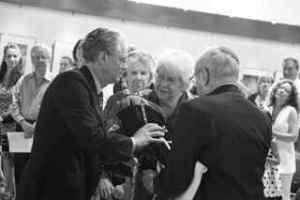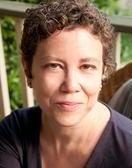
Protestant and Jewish grandparents hand down the Torah at an interfaith Bar Mitzvah. Photo stephaniewilliamsimages
In yesterday’s Washington Post, Michelle Boorstein reports on Washington DC synagogues “trying to make room for interfaith couples.” Note the use of the word “trying” here. The article does chronicle significant progress in the Jewish community in welcoming interfaith families, and that is cause for celebration. But it also recounted poignant stories about families trying to connect to Judaism and facing restrictions, limitations, and exclusions. Such restrictions help to explain why a growing number of interfaith families (including 25% of intermarried Jews nationally, according to Pew Research) now choose to raise children with both family religions, rather than choosing one religion.
Below, I list ten of the many reasons couples join interfaith family communities, instead of, or in addition to, synagogues. These reasons are drawn directly from the Post‘s article. Of course, there are also many positive reasons families choose an interfaith community, including support from both a rabbi and a minister (or priest), literacy for children in both religious languages, and being part of a community in which neither spouse feels like a guest. For a deeper understanding of why interfaith families choose interfaith communities, I recommend reading Being Both.
I argue that excluding families who want to stay connected to Judaism does not help Judaism, and it certainly does not help interfaith families. Here is a list of ten ways that Jewish communities continue to alienate interfaith families:
- Even Reform rabbinical schools do not accept students in interfaith relationships.
- Conservative rabbis are not allowed to attend, or witness, interfaith weddings.
- Many Reform rabbis still refuse to officiate at interfaith weddings.
- Some rabbis refuse to co-officiate (at weddings, baby welcomings, coming of age ceremonies, funerals) with Christian (or Hindu, or any other) clergy.
- Some rabbis require a couple to promise to raise exclusively Jewish children.
- Some rabbis will perform same-sex marriages but not interfaith marriages.
- Reform Judaism stands by a resolution advising synagogues to refuse Jewish education to children if they are being formally educated in a second religion.
- Many synagogues have restrictions on membership for spouses who are not Jewish.
- Many synagogues have restrictions on how a spouse from another religion can participate in life cycle ceremonies.
- A special prayer for an interfaith couple, or for a parent or grandparent from another religion, is an improvement over complete exclusion. However, for some families, separate but unequal is still a problem.
Susan Katz Miller’s book, Being Both: Embracing Two Religions in One Interfaith Family is available now in hardcover and eBook from Beacon Press.

